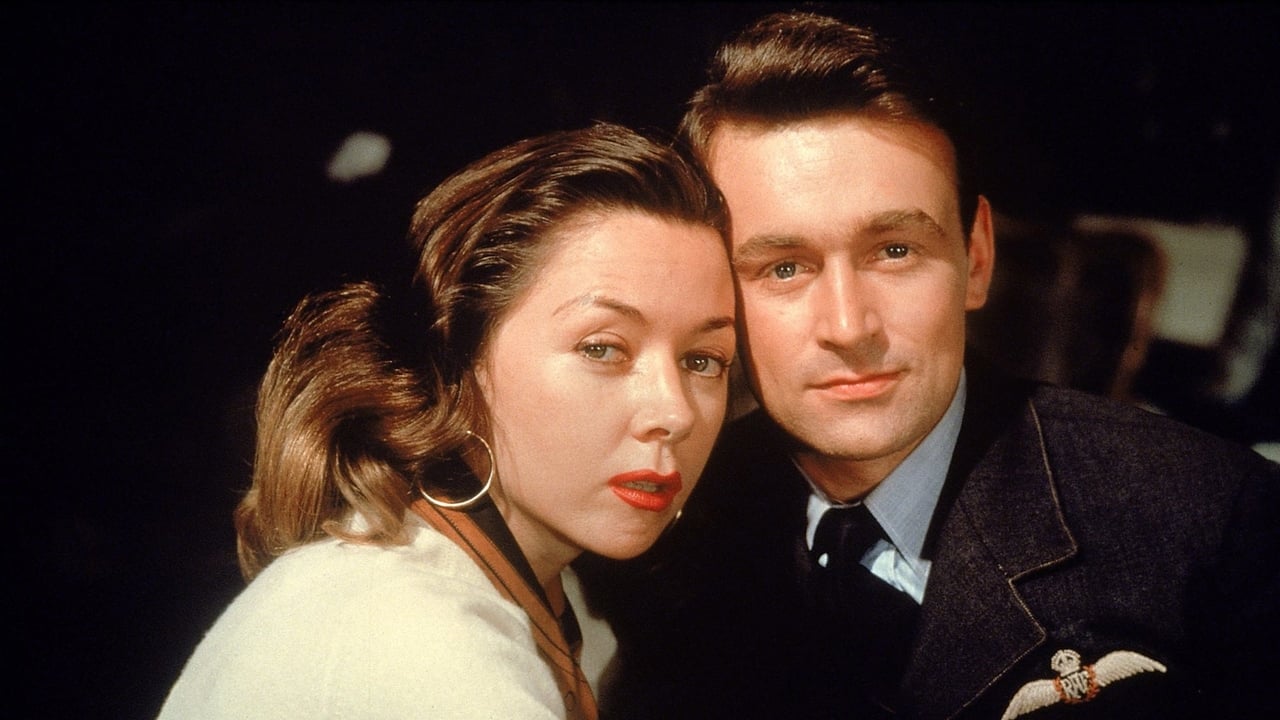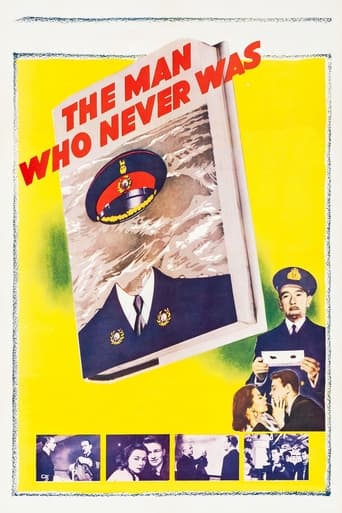

Slow pace in the most part of the movie.
... View Morejust watch it!
... View MoreExcellent characters with emotional depth. My wife, daughter and granddaughter all enjoyed it...and me, too! Very good movie! You won't be disappointed.
... View MoreClose shines in drama with strong language, adult themes.
... View MoreI came across this old movie on Netflix streaming movies. A very good WW2 caper, it helped the good guys win. Apparently based on real events.It is the springtime 1943 and Allied forces have freed several areas from Nazi occupation. The next logical region to attack is Italy, specifically Sicily. But they judge that to do so likely would result in 30% losses on the battlefield. They need to find a way to get the Nazis to movie some of their defenses away from Sicily.Clifton Webb is really good as Lt. Cmdr. Ewen Montagu who hatches a plan. If they can make the Nazis believe their next target is Greece then invading Sicily will be much easier. But how to do it?Mulling over several ideas, they decide to find a corpse that a family either won't claim or will agree to donate for the mission. It has to be someone who died of pneumonia so the lungs will look consistent with drowning. Then supply the corpse with a uniform, fake identity, and fake letters being carried to African commands explaining the (fake) plan to invade Greece. Then have a submarine carry it to release to be washed up on the Spanish shores.Lots of things need to go right to make this work, so the movie, in a rather deliberate story telling style, takes us through it. Stephen Boyd, still in his early 20s, is the German spy sent to London to check out and see if the dead officer and his letters are real. He has to look up several connections, including the young lady who wrote the love letter found on him. He is given the identity Patrick O'Reilly and speaks with an Irish accent. A very good 1955 movie, good story telling.SPOILERS: As O'Reilly digs up people in London they all begin to suspect that he was there as a Nazi spy, and at the last minutes they figured out if they arrested him, lack of a confirming message to his headquarters would mean the man and message were fake. So they held off, pretended not to know why he was there, he sent the confirming message, the Nazi troops left Sicily which allowed Allied forces to successfully capture the territory.
... View MoreThis is an exciting and unique WWII spy thriller based on Operation Mincemeat - an attempt by the allies to feed false information to the Nazis to divert attention from the upcoming invasion of Sicily.It's really fascinating to see how they planted information on a dead body ( a fake spy) to feed the false documents to the Nazis.A real scene stealer is Stephen Boyd who plays the Irish spy who working for the Nazis checks out the veracity of the dead man's identity. Politics makes strange bedfellows and it is interesting to remember the there were a few Irish who sided the Nazis against the British because they had a common enemy. The scenes where he talks to the "girl friend" are quite scary.A movie with a good story can be more fascinating and tense than any of the new action spy thrillers like the Bourne series.
... View MoreWilliam Wyler was so impressed by Stephen Boyd's performance that he cast him as Messala in his own "Ben Hur",a part which was very subtle in the first sequences.But you have got to be patient because he makes himself wait:however when he is on the screen,he makes the movie his,except in the scene with the two women in which Gloria Grahame matches him.This is an excellent spy thriller,with a first part verging on documentary;the second part looks like a poker game:at a time we think that Grahame lets the cat out of the bag but it is not so ;and the last picture is really moving ,worthy of Frank Borzage and masterpieces such as "three comrades ":the father got his wish,not only his dear son got a decent burial but he also helped to fight against the Nazis beyond death.
... View MoreThis film is based on a book of the same title by Ewen Montagu, a distinguished lawyer and judge who served in British Naval Intelligence during World War II. It was Montagu who devised Operation Mincemeat, which is portrayed in this film, apparently with a high degree of accuracy. (The real Montagu even appeared in a bit part as a naval officer in the film.) The 'man who never was' was a young man in London who had died of pneumonia, whose corpse was used in devious disinformation campaign to fool the Germans. His real name was suppressed and has never been revealed. But he was unaware of the role his body played in this story, because the permission to use his body was given by his father, who was his only living relative, after the son's death. The British forces were faced with the need to invade Sicily after their successes in North Africa. But they wished to divert as many of the German defences as possible to make that assault easier, and to save lives. The role of Operation Mincemeat was to trick the Germans into believing that the British would invade Greece, not Sicily. They did this by dressing the dead man in a British naval officer's uniform, securing a briefcase to his arm, and launching him into the sea off the coast of Spain from a British submarine. The personal hand-written letters from Lord Mountbatten and General Eisenhower which he carried were meant to be ultimately convincing, as the signatures were real. They had studied the tides and knew that his body would be washed up on the beach, and they targeted a beach where a particularly keen Nazi spy was based who would be sure to end up with the briefcase despite Spain's purported 'neutrality'. (Spain was hardly neutral, considering that it was the Gestapo who had selected General Franco to be the dictator of Spain in the first place, but that is another story. There is 'official neutrality' and then there is 'real neutrality'.) Clifton Webb, normally a very fine actor indeed, plays Montagu. But he does so much too stiffly. I think perhaps Webb, as an American, got a bit too carried away with the British 'stiff upper lip' routine and overdid things in that respect. Gloria Grahame plays a young girl named Lucy who inadvertently plays a key part in this tale. She is excellent, especially in the highly emotional scenes, as she always excelled at portraying extreme emotions. However, the makeup and hair in this film are absolutely terrible. You can see Webb's grey roots, Grahame's lipstick is way too bright, it is a mess from that point of view. Even worse however is the lighting. Ossie Morris was the cinematographer, and I don't think he ever did a worse job. My old friend Arthur Ibbetson was his operator, and I can't imagine he was pleased, as he was the one who had to look through the lens and wince, but obviously the operator cannot criticise his boss. Many of the actors are sweating far too much (Grahame's face is sometimes streaked with sweat over her excessive makeup), and the interiors are so harshly lit it almost looks amateur. Really, I was so shocked, considering how distinguished Morris was later to become. Stephen Boyd does very well at playing an Irishman who hates the English and works as a Nazi spy. Boyd tries to discover whether the washed-up corpse is genuine or a disinformation 'plant'. The British narrowly convince him that the man was real, so that he relays to Germany the confirmation they want before they will divert many of their defences from Sicily to Greece. And speaking of neutrality, there are many criticisms which could be made also of the genuineness of Ireland's supposed 'neutrality' during the War, as this film strongly implies. But then again, that too is another story. Suffice it to say that there were plenty of Nazis in Ireland, and that some of their successors ended up as IRA killers. Any excuse to kill the hated English! This film is a plodder, its pace is so slow one could easily nod off. When I saw it as a child I was greatly impressed by it. The idea that there could be 'a man who never was' caught my imagination, and I was deeply intrigued by the story. But in those days, films were often rather slow and dawdling, and no one minded, even children. I don't mind at all when an artistic director like Luchino Visconti or Carl Dreyer takes forever over his scenes, because that is art. But there was no need for this simple espionage drama to drag its feet in the way that it does. It was directed by Ronnie Neame, and I think he must have been very tired at the time.
... View More